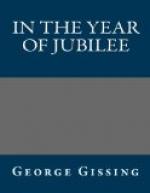Renewal of intercourse with people of good social standing made him more than ever fretful in the thought that he had clogged himself with marriage. Whatever Nancy’s reply to his announcement that he was home again, he would have read it with discontent. To have the fact forced upon him (a fact he seriously believed it) that his wife could not be depended upon even for elementary generosity of thought, was at this moment especially disastrous; it weighed the balance against his feelings of justice and humanity, hitherto, no matter how he acted, always preponderant over the baser issues of character and circumstance.
He stood leaning upon the parapet of Westminster Bridge, his eyes scanning the dark facade of the Houses of Parliament.
How would the strong, unscrupulous, really ambitious man act in such a case? What was to prevent him from ignoring the fact that he was married, and directing his course precisely as he would have done if poverty had come upon him before his act of supreme foolishness? Journalism must have been his refuge then, as now; but Society would have held out to him the hope of every adventurer—a marriage with some woman whose wealth and connections would clear an upward path in whatever line he chose to follow. Why not abandon to Nancy the inheritance it would degrade him to share, and so purchase back his freedom? The bargain might be made; a strong man would carry it through, and ultimately triumph by daring all risks.
Having wrought himself to this point of insensate revolt, he quitted his musing-station on the bridge, and walked away.
Nancy did not write again. There passed four or five days, and Tarrant, working hard as well as enjoying the pleasures of Society, made up his mind not to see her. He would leave events to take their course. A heaviness of heart often troubled him, but he resisted it, and told himself that he was becoming stronger.
After a long day of writing, he addressed a packet to a certain periodical, and went out to post it. No sooner had he left the house than a woman, who had been about to pass him on the pavement, abruptly turned round and hurriedly walked away. But for this action, he would not have noticed her; as it was, he recognised the figure, and an impulse which allowed of no reflection brought him in a moment to her side. In the ill-lighted street a face could with difficulty be observed, but Nancy’s features were unmistakable to the eye that now fell upon them.




